Tuesday Feb 17, 2026
Tuesday Feb 17, 2026
Thursday, 17 August 2017 00:58 - - {{hitsCtrl.values.hits}}
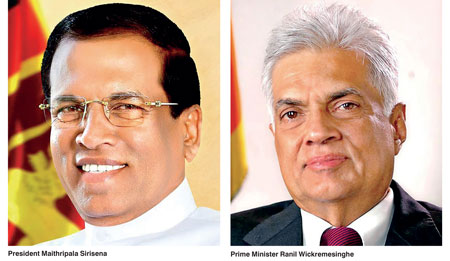 The Friday Forum has expressed dissatisfaction with the policy stagnation and slow delivery of major goals by the Government and has given a breakdown of important targets to be achieved. Given below is the full statement released by the Friday Forum:
The Friday Forum has expressed dissatisfaction with the policy stagnation and slow delivery of major goals by the Government and has given a breakdown of important targets to be achieved. Given below is the full statement released by the Friday Forum:
This Government has been in office for two years, and its agenda seems increasingly disconnected from the hopes and expectations of those who elected it to office on the promise of good governance – ‘yahapalanaya.’
The Friday Forum has, in several statements over the last two years, both commended the Government for its positive initiatives and offered constructive criticism of some current policies and actions. We reiterate below some priority areas in which the Government must act immediately, if the President and Prime Minister are to retain the confidence of the majority of citizens who elected them to office, and expand that constituency to support its agenda of reform. Firstly, the task of government is given below.
Constitutional reform
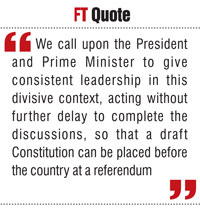 For several years all political parties campaigned to repeal or reform the constitution of 1978. This was the one issue on which there appeared to be consensus in 2014 and 2015. Yet today, we are receiving conflicting messages from both within the Government and the Joint Opposition (JO) on constitutional reform. Former President Mahinda Rajapaksa, in his 2009 support for the APC, publicly proposed ‘maximum devolution’ both verbally and in written documents. Yet today, he leads groups who stridently object to changing the presidential system of government, suggesting that it will weaken the centre and create an environment for separatism. This cynical exploitation of identity politics must be rejected by the people. We call upon the President and Prime Minister to give consistent leadership in this divisive context, acting without further delay to complete the discussions, so that a draft Constitution can be placed before the country at a referendum. The often repeated public statements by some holding office in support of constitutional reform are contradicted by others in government who question the process. The public is further confused when the need for constitutional reform is used as an excuse for the undemocratic postponement of local government and provincial council elections and delays in transitional justice reforms.
For several years all political parties campaigned to repeal or reform the constitution of 1978. This was the one issue on which there appeared to be consensus in 2014 and 2015. Yet today, we are receiving conflicting messages from both within the Government and the Joint Opposition (JO) on constitutional reform. Former President Mahinda Rajapaksa, in his 2009 support for the APC, publicly proposed ‘maximum devolution’ both verbally and in written documents. Yet today, he leads groups who stridently object to changing the presidential system of government, suggesting that it will weaken the centre and create an environment for separatism. This cynical exploitation of identity politics must be rejected by the people. We call upon the President and Prime Minister to give consistent leadership in this divisive context, acting without further delay to complete the discussions, so that a draft Constitution can be placed before the country at a referendum. The often repeated public statements by some holding office in support of constitutional reform are contradicted by others in government who question the process. The public is further confused when the need for constitutional reform is used as an excuse for the undemocratic postponement of local government and provincial council elections and delays in transitional justice reforms.
There seems to be no serious political will on the part of the Government to lead the country in constitutional reform. Expert committees have submitted their reports. Reports of the public consultations, supported by government, both on constitutional reform and transitional justice have been submitted. Failure to give leadership and take positive steps to complete the debate and the discussions within a specific time frame only reinforces the sense of false promises.
Corruption and law enforcement
The Government’s record on corruption and law enforcement is abysmal. It has established various new institutions and promised to strengthen the traditional ones like the Police and Attorney General’s Department. Yet these agencies struggle to cope, lacking adequate resources and personnel to handle their responsibilities. There are also constant allegations of selective prosecutions due to political influence at the highest levels, such as the much publicised telephone call to the IGP. Inevitably these agencies are perceived as inefficient and lethargic, or acting under directions of various political lobbies.
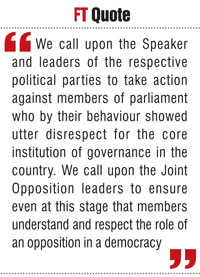
The failure of the President and the Prime Minister to respond quickly to incidents of ineffective law enforcement is a special source of concern, especially when the Police and armed forces use unnecessary violence to crush public protest; or when there are allegations of corrupt investigations, and of selective arrests and detentions. The much publicised bond inquiries are a damning indictment of public institutions and the Government. It has taken four inquiries and two years for a credible procedure of investigation to be established. The information emerging in the Commission of Inquiry speaks volumes of the systemic failures in what were independent public institutions. Many senior public officials expressed the view that the leadership culture at the Central Bank did not permit or encourage them to express dissenting or alternative views. The ‘failure to carry out orders from the top’, contrary to professional responsibilities, was met with sanctions and/or discrimination that prejudiced career advancement and prospects. Sadly the Central Bank is not the only public sector institution in this country that has this type of unacceptable working environment and leadership culture.
We now have a ridiculous situation where those persons of the former regime who are facing corruption charges in the courts attack senior members of government for acts of corruption. The public also frequently observes politicians facing charges of corruption in courts or inquiries, emerging from the pending proceedings triumphantly surrounded by political supporters and TV cameras. This brings disrespect to the legitimacy of the rule of law.
The Minister of Foreign Affairs added a new dimension to this phenomenon by vilifying the Attorney General’s Department and suggesting, when he gave evidence at the COI, that they were harassing him because they desired promotions! This undermining of public institutions, and the nature of his responses as a witness in the proceedings, made it imperative that he should not hold cabinet office.
The President and the Prime Minister must also hold to account the minister who justified violence against striking unions, thus undermining government obligations to ensure law and order, and to protect citizens against violence by private actors. It is ironic that politicians undermine the administration of justice, while stating publicly that they will continue to hold office until they are convicted by a court of law. Those who hold public office must be held accountable for not fulfilling their public duties.
Abuse of executive power
The Friday Forum has constantly highlighted the deplorable manner in which the Government continues to engage in acts of abuse of executive power in regard to appointments and dismissals. The manner in which the Chairman and the board of eminent professionals in the Sri Lanka Foundation Institute were asked to resign; and the dismissal and persecution of the Deputy Chairperson of the National Child Protection Authority, and interdiction of its legal officer without following due procedures, must be condemned. When these incidents occur through the President’s or Prime Minister’s office, they are accountable to the people for acts of nepotism, abuse of power and improper interference with public administration. They must inquire whether officials have misused their power under political influence; and act to prevent such abuses. This is the least that can be expected if norms of good governance are to be followed. Similarly, we highlight the continuing failure to act on the Weliamuna Report and other issues in Sri Lankan Airlines, particularly after much publicised meetings with the board.
Religious extremism
There have been public statements against religious extremism by the President, Prime Minister and Cabinet. However, these views appear as empty rhetoric when the Government does not give consistent leadership in finding a solution to the national question through devolution of power; and in holding accountable anyone who has perpetrated grievous crimes under domestic law including during the armed conflict. Misinterpretation of phrases such as ‘reconciliation’ and ‘transitional justice’ as a threat to the majority race and religion (the Sinhala community and Buddhism), has become the destructive agenda of the Joint Opposition. This cynical display of identity politics is never counteracted by the Government by an informative communication strategy. Rather, this divisive politics is strengthened by the Government’s failure to communicate with the public and clarify proposed laws, policies and programs.
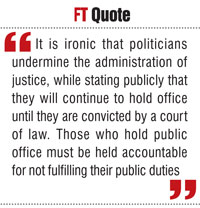
The Government is constantly giving assurances that ‘ranaviru’ will not be prosecuted. While the Buddhist clergy can have an advisory role and express opinions on constitutional reform, it is not acceptable that they should determine the process. Supporting these positions encourages vitriolic extremism and racism. The manner in which such proponents, including monks who use hate speech, are not held accountable for their actions with immediate arrest and detention, is perceived by the public as a manipulation of the legal system by those in power. This approach must be changed, and the Government must give leadership in effectively enforcing the law against all religious dignitaries or lay persons who violate the law, without fear or favour. The idea that they are immune from prosecution as argued by some Buddhist clergy does not conform to either historical tradition and practice or the law of the land.
Respect for international law
The President and Prime Minister must give leadership and together take a firm stand in regard to Sri Lanka’s obligation as a State Party to internationally ratified treaties and as a member state with a seat at the United Nations. Rhetoric in this regard is especially deplorable when there is no effort to address serious issues such as police torture, nor to give redress to victims of violence perpetrated by law enforcement authorities. This attitude undermines the core norms of democratic governance which is to protect citizens from violence even during armed conflict. Implementing state obligations to respect and protect human rights is a commitment to citizens of Sri Lanka as holders of human rights and not a reflection of meek obedience to the dictates of an alien international community. The Sri Lankan state is a member of the international community and must fulfil its responsibilities as a member of that community. The alleged politicisation of the human rights agenda when it occurs can be critiqued, but this is no justification for violating obligations created by international law towards the country’s own citizens. Cabinet ministers cannot by their own words and actions undermine state obligations under international law to implement treaty commitments and respect international institutions. Similarly, the tendency of some politicians to seek intervention by what they call the ‘international community’ must be questioned. The focus must be on state obligations to its citizens to enforce human rights norms. The Sri Lankan state is part of the international community, and it is a peer with other nations of that community.
Role of Opposition and Trade Unions
In the Sri Lankan context both these groups also hold power in society. The Joint Opposition (JO) has acted consistently as the ‘spoilers of the nation’ for short term political gain, politicising negatively every effort to reach a consensus on key citizens’ concerns on constitutional reform and transitional justice. The complete distortion of clear provisions in the legislation on missing persons, aimed only at tracing alleged victims, in order to create paranoia on prosecutions of ‘ranaviru’ for war crimes, is symptomatic of this deep seated desire to subvert initiatives on administration of justice in the public interest.
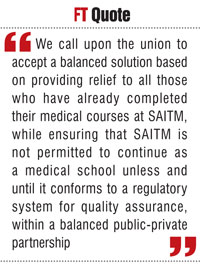
Some members have also constantly undermined the dignity of Parliament, witnessed most recently in the shameful manner in which they disrupted a debate by occupying the Speaker’s and President’s seats in the chamber, enacting a mock session of parliament. We call upon the Speaker and leaders of the respective political parties to take action against members of parliament who by their behaviour showed utter disrespect for the core institution of governance in the country. We call upon the Joint Opposition leaders to ensure even at this stage that members understand and respect the role of an opposition in a democracy. They must be facilitators of good governance for the benefit of the nation and the people, rather than a destructive spoiler of national progress, peace and development.
Similarly trade unions must exercise the democratic right of protest peacefully, without causing destruction to life or property. Negotiating with a sense of responsibility to settle a trade union dispute is at the heart of the right to establish and function as unions. In this spirit, the GMOA must continue to negotiate a settlement of the SAITM issue which has disrupted medical education and services to a public that is dependent on the state system of healthcare. We know the Rajapaksa administration created the problem when they manipulated the higher education and the regulatory system in support of that institution. Some medical professionals of the SLMC who objected to the Rajapaksa initiative on SAITM did not succeed in getting this professional body to resist the erosion of standard setting in medical education. The immediate concern that must be resolved is the negative impact on successive batches of young medical students and their parents. We call upon the union to accept a balanced solution based on providing relief to all those who have already completed their medical courses at SAITM, while ensuring that SAITM is not permitted to continue as a medical school unless and until it conforms to a regulatory system for quality assurance, within a balanced public-private partnership. Such partnerships exist today in other professions like law, architecture, computer science and engineering; and medical education must also respond to this national need. The Government’s responsibility is to resource and support the public education system to achieve excellence, whilst regulating the private sector according to established guidelines and norms.
For and on behalf of Prof. Savitri Goonesekere, Dr. A.C.Visvalingam, Faiz-ur Rahman, Priyantha Gamage, Prof. Ranjini Obeyesekere, Prof. Gananath Obeyesekere, Bishop Duleep de Chickera, Prof. Arjuna Aluwihare, Danesh Casie-Chetty, Rev. Dr. Jayasiri Peiris, S.C.C. Elankovan, Javid Yusuf, Prof. Camena Guneratne, Dhammapala Wijayanandana, Pulasthi Hewamanna, Prof. Gameela Samarasinghe, Prashan de Visser, Shanthi Dias, and Chandra Jayaratne.
(The Friday Forum is an informal and self-financed group dedicated to democracy, good governance, human rights and the rule of law. It has for over five years sought to alert the public on issues concerning the rights of the citizen. We work on a non-partisan basis and have been critical of both the Government and Opposition.)